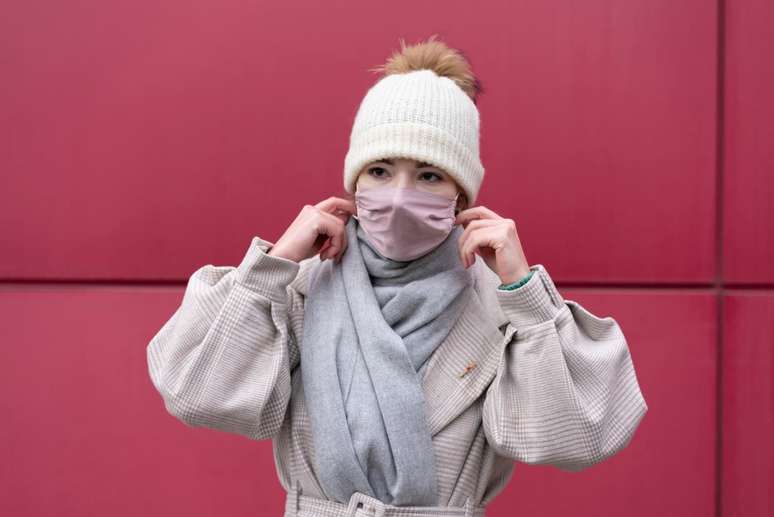As if the cold, which naturally dries out our skin, were not enough, we can make the situation worse with some bad habits.
Of course, our skin is drier in winter. This means that there is a climate component that has a strong influence on the hydration of our skin: if we do nothing wrong, we will still have to fight against it. But the truth is that winter is usually terrible for the beauty of our skin, precisely because we continue to abuse bad habits. Below, experts explain more about these terrible skin habits.
Don’t apply sunscreen
Ultraviolet radiation, even in winter, causes photoaging and possible spots. “Photoaging leads to sagging and, in the long term, can cause skin cancer. Even in winter indoors, using sunscreen is essential. Ultraviolet radiation passes through glass and thin fabrics (curtains) and can reach the skin in the same way,” explains dermatologist Paola Pomerantzeff, member of the Brazilian Society of Dermatology.
Those with melasma should be even more concerned, relying on filters that protect against heat and visible light. If your sunscreen does not have this type of antioxidant protection, you will need to formulate a product with Alistin, OTZ 10, and Pro Shield MDC in the formula.
“The action of these active ingredients is added to that of sunscreen. In the formula, Alistin is an antiglycooxidant that, in addition to protecting the DNA and proteins of the skin, has a protective action against damage caused by excess sugar in the skin (glycation); OTZ 10 neutralizes toxic byproducts generated by UVA radiation and heat, reduces the activity of enzymes that degrade collagen and neutralizes reactive oxygen, nitrogen and carbonyl species. Pro Shield MDC is a vegetal sucrapeptide, extracted from green coffee rich in melanoidins, with a natural protective action against digital pollution. Blue radiation, originating from digital pollution, promotes damage to the skin, contributing to premature aging and the development of wrinkles and melasma”, explains Patrícia França, pharmacist and scientific director of Biotec Dermocosméticos.
Forget about moisturizing and repairing creams
In winter, with lower temperatures and drier air, skin tends to become drier, according to the dermatologist.
“It can even become red and flaky. This is because our skin starts producing less of its natural oil. This dryness needs to be compensated for by intense hydration. Dry skin is more likely to ‘crease’, which can lead to fine lines. The best moisturizers contain low molecular weight hyaluronic acid (small molecules that can cross the skin barrier and penetrate the inner layers of the skin to hydrate),” explains the doctor.
Also avoid eye contour cream, especially in this period in which the cold tends to make the face more “tired”. And, still on the subject of hydration, we must never forget the skin of our feet, hands and body in general.
“Our body has fewer sebaceous glands than our face and therefore dries out even more. The neck and chest can and should receive the same moisturizing and protective cream as the face. Just like the hands. As for the rest of the body, we should use a body moisturizer to apply after the shower, daily. The feet can be moisturized with specific creams, even more effective, when necessary,” explains Paola.
Retinoid abuse
According to the dermatologist, retinoids are excellent for treating the skin and preventing photoaging.
“They promote cell renewal, even out skin tone and improve texture. Since they cause photosensitivity to the skin, autumn and winter are excellent times to use them. However, they tend to dry out the skin. If used without guidance, in excessive quantities, they can lead to extreme dryness, including irritation and redness of the skin. The ideal is to consult a dermatologist to find out the ideal concentration and frequency of the active ingredient for your skin,” explains the doctor.
Trust me, in some cases you need to balance this use or invest in non-abrasive exfoliants, such as Rednek facial scrub, as the product is able to remove impurities and dead skin cells, unclog pores and help cell renewal. Another strategy is to opt for HydraFacial hydrodermabrasion, a unique and completely customizable experience, capable of giving you the best skin of your life.
“HydraFacial promotes an instant improvement in skin quality, helping to even out tone and texture and increase skin firmness, luminosity, softness and shine thanks to the patented Vortex-Fusion technology in the tips, which have a unique spiral design that generates a vortex effect that, combined with the vacuum suction technology of the device, can easily expel and remove impurities from the skin while providing hydrating solutions,” explains dermatologist Mônica Aribi, member of the Brazilian Society of Dermatology and the Brazilian Society of Dermatological Surgery.
Although it uses skin-renewing acids, its unique system allows it to deliver hydrating solutions, so the procedure can be performed even on sensitive skin.
Take very hot baths
Taking a “naked” bath in winter, “sauna” style, is delicious, don’t you agree? “However, hot water removes the skin’s protective barrier, the lipid mantle. Even more so if you overdo the use of soap. So the ideal is a hot and quick bath! You can delay hydration after the shower, that’s for sure,” says Paola.
Drink little water during the day
When it’s cold, many people don’t feel thirsty and end up reducing their water intake. “This is very bad. We need to maintain water hydration of at least 2 liters of water per day. If our body becomes dehydrated, it takes water from the periphery (including the skin) to compensate. As a result, our skin becomes dehydrated and dull. The lips can also become drier,” says the dermatologist.
Excessive consumption of alcoholic beverages
In winter it is common to increase the consumption of wine and even spirits, but excess alcoholic beverages are dangerous and lead to dehydration of the entire organism.
“As a result, the skin becomes even more dehydrated. The result is dehydrated and dull skin. In addition, excess alcohol leads to an inflammatory process of the skin with the possibility of premature aging (appearance of wrinkles, sagging skin and decreased collagen). But it is not necessary to be 100% non-alcoholic. A glass of red wine a day is allowed as long as it is accompanied by a glass of water. In this way we maintain hydration, ingest the natural antioxidants of wine (resveratrol) and relax. The antioxidants present in wine are able to fight free radicals in the skin. Our skin thanks us,” says Paola.
Unregulated power supply
In winter, we tend to eat more sweets. “And lately, there are many people who attribute their anxiety to high sugar consumption and consequently their skin suffers. Foods with a high glycemic index lead to the process known as glycation. In this process, collagen fibers undergo harmful changes. The result is looser skin and more wrinkles. An alternative is to eat 70% cocoa chocolate. This chocolate has a lower sugar and fat content and has a high concentration of cocoa, which is a powerful natural antioxidant. It is good for our skin, as long as we consume it in moderation,” explains the dermatologist. You can also use food to benefit your skin.
Cigarette, the eternal villain
In addition to these habits, it is worth talking about smoking, which is not necessarily a bad winter habit.
“Inhaled substances release free radicals that cause inflammation and premature aging of the skin. At the same time, nicotine causes blood vessels to narrow and the skin receives less oxygen. This can damage the elastic fibers (elastin fibers) and collagen in the skin and reduce the production of new collagen. The result is dull and inelastic skin, with marked premature aging. The repetitive movement of swallowing, through the muscles of the mouth region, leads to the appearance of numerous dynamic wrinkles around the lips. These wrinkles that appear due to movement become static, that is, even at rest the folds are present in the skin around the mouth,” explains the dermatologist.
So what do you do? It’s best to find a way to quit, seeking medical help and trying to fit activities into your day that help you combat the anxiety and triggers that led you to smoke. “And seek medical help to treat the effects that smoking has left on your skin,” he concludes.
inspires transformation in the world of work, in business, in society. Compasso, a content and connection agency, is born.
Source: Terra
Ben Stock is a lifestyle journalist and author at Gossipify. He writes about topics such as health, wellness, travel, food and home decor. He provides practical advice and inspiration to improve well-being, keeps readers up to date with latest lifestyle news and trends, known for his engaging writing style, in-depth analysis and unique perspectives.








